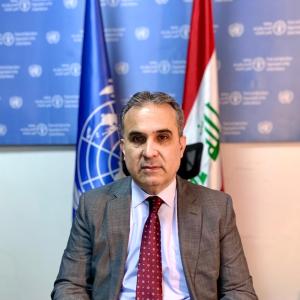FAO Iraq, CRC, and Iraqi Ministry of Agriculture Collaborate to Address Desert Locust Challenge
19 October 2023
Baghdad, Iraq – 18 October 2023 - The Food and Agriculture Organization (FAO) of the United Nations, in partnership with the Commission for Controlling the Desert Locust in the Central Region (CRC) and the Iraqi Ministry of Agriculture, launched a desert locust management training programme to ensure a rapid and effective response to locust outbreaks. Desert locusts, known as one of the world’s most devastating agricultural pests, pose a serious threat to crops and pastures, driven by climate change, land degradation, and regional conflicts.

At the opening ceremony, FAO Representative in Iraq, Dr Salah El Hajj Hassan, said: "This training programme is a reflection of FAO's commitment to support member countries in addressing critical agriculture and food security issues. We are equipping Iraq with the necessary tools to effectively combat the growing threat of the desert locust".
From October 15th to 19th, 2023, FAO experts, including the Executive Secretary of the CRC, Mr. Mamoun Al Alawi, will lead a comprehensive training course aimed at equipping the Ministry of Agriculture staff with the knowledge and skills needed to effectively manage desert locusts. The program covers key aspects, including biology and ecology, survey and monitoring methods, control methods including chemical, biological and environment health and safety standard, and outbreak preparedness and response.
The 22 participants include government officials responsible for desert locust management, plant protection officers, and other stakeholders committed to combating this challenge.
This hands-on training, designed in collaboration with the CRC, combines theory and practice, giving participants the opportunity to learn from field experts. Upon course completion, participants will be equipped to identify and monitor desert locust populations with precision, implement effective control measures tailored to Iraq's specific needs, and develop and implement outbreak preparedness and response plans to minimize damage. Assessment will involve written assignments, practical evaluations and field simulation, culminating in a certificate of completion for successful participants.
The training program fosters networking among stakeholders, promoting cooperation and coordination.
Mr. Al Alawi stated: "As the Executive Secretary of the CRC, I am proud to play a pivotal role in this collaboration. The CRC serves as a regional platform dedicated to coordinating efforts to combat desert locust infestations. By working hand-in-hand with FAO ‘s representation in Iraq and the Iraqi Ministry of Agriculture, we aim to bolster Iraq's capacity to protect its agricultural resources and food security, ensuring a more resilient and sustainable future."
This collaborative effort not only addresses the pressing issue of desert locust infestations but also aligns with several United Nations Sustainable Development Goals (SDGs), including Goal 2: Zero Hunger, Goal 3: Good Health and Well-being, and Goal 17: Partnerships for the Goals. By equipping Iraq with the knowledge and tools to manage this agricultural challenge, we move one step closer to achieving these vital SDGs and securing a sustainable and food-secure future for the region.


He started his career in 1984, as Senior Research Assistant in the Agricultural Research and Education Centre (AREC), American University of Beirut. From 1987 to 1991, he was Coordinator of the Student Training Programme, and also Agriculture and Horticultural Teacher for the Faculty of Agriculture, at the Lebanese University.
From 1991 to 1995, he worked as Agricultural Engineer at the Ministry of Agriculture, Bekaa Regional Office, Zahlah and was then assigned to the Agricultural Research Institute in the Tal Amara station, first as Head of the Crop Production Department and subsequently in charge of the Plant Protection Laboratory. From 2002 to 2006, he was Director of the Kfardane Research Station (Agricultural Research Institute). In 2008, he became Visiting Scientist at the International Maize and Wheat Improvement Centre (CIMMYT) and Coordinator of a project with the International Centre for Atomic Energy Agency, Vienna.
In 2010, he served as Advisor to the Minister for Agriculture of Lebanon. In 2011, he became President of the Pesticide Scientific Committee, Head of the Phytoplasma Committee and Director of the Agriculture and Rural Development Programme (ARDP) (EU-funded project). From 2010 to 2013, he represented Lebanon in negotiations with EU, Egypt, Jordan and Iraq. During his career, Mr Hajj Hassan also carried out a number of other functions. He represented the Lebanese Agricultural Research Institute (LARI) in several research programmes with the International Centre for Agricultural Research in the Dry Areas (ICARDA) and the American University of Beirut. He was Coordinator of the Mashreq/Maghreb project with ICARDA, representing Lebanon in the Steering Committee, as well as being the Head of the Sugar-beet Delivery and of the Wheat Delivery Committees. For a number of years, Mr Hajj Hassan worked for the preparation of FAO TCP projects and served as the National Director of a TCP project. He joined FAO in January 2014 as FAO Representative in Yemen. Mr Hajj Hassan succeeds Mr El Zubi as FAO Representative in Iraq.



